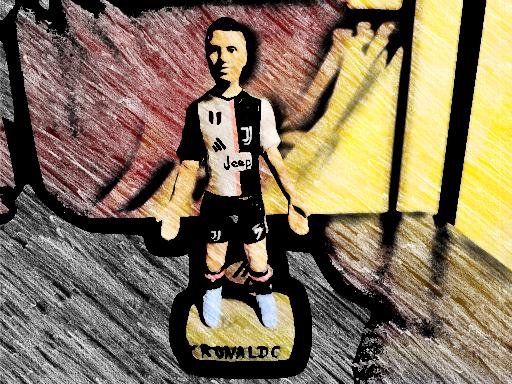The hard life of the champion!

I've always wondered what's behind exceptional performance.
What distinguishes a champion in football from a player of average ability? Or a chess master from a simple player? Or even a great business leader from others who are less successful?
What is different about people who are able to put in exceptional performances from others?
All these and many other questions led me to delve deeper and study this topic.
The first thing that catches the eye is that, in almost every area, a champion manages to identify recurring patterns in a set of realities that to other people's eyes would seem to be governed by chance and chaos; this is due to the quantity and quality of mental representations of him.
Thanks to years of practice and repetition, the champions develop very complex and extremely sophisticated representations of the various situations they encounter in the context of their activity; this allows them to make quicker and more accurate decisions and to respond more quickly and effectively in various situations.
It is important to understand that we all use mental representations every day.
Let's take a trivial example, if I moved to North America I might sooner or later meet an opossum, in fact it would probably be a frequent encounter, I would learn that it has a prehensile tail, that it climbs trees, that it belongs to the marsupial species; all the various information would gradually integrate until an overall concept emerges.
Well at this point, hearing the word opossum, I would have access to all the information relating to this little animal and, in addition to having added a new term to my vocabulary, I would also have added a new mental representation in my head.
If we take the example of footballers, it will be obvious that the best ones, the champions, obtain better results because after training and repetitions they know where to make the ball go or where the ball will arrive; the mental representations that are created lead them not only to know what to do and how to behave, but they are able to do it earlier and faster than other players.
In order to develop mental representations of high qualitative value it is necessary to dedicate ourselves to what is called "Intentional Practice".
Intentional practice is nothing more than a very targeted exercise carried out daily, it must by its nature be very difficult in order to develop attention; if we think of a musician, when he practices with an amateur attitude he plays a few pleasant pieces and nothing more, the expert instead performs many difficult exercises, sometimes even very boring, concentrating above all on the difficult passages.
Returning to the sporting context, the best ice skaters or "synchro" swimmers train by trying the jumps and steps they perform more rarely, while an amateur would tend to concentrate on those he already knows.
Lastly, during my study, I was struck by the understanding that the more we know about a topic, the more we are able to create accurate mental representations which also allow us to imagine, make hypotheses, links and connections between different elements of knowledge; it goes without saying that this helps to develop the capacity for experimentation and innovation and also the skills that allow us to verify the validity of a hypothesis and this process ends up further developing the knowledge and skills possessed.
Precisely this last process is what allows a football champion to invent a new dribble, a particular play or an unthinkable pass.
Well, I think I can stop for today, I've got a lot of irons in the fire.
Tell me were you aware of this data?
Did you know what was at the basis of excellence and what went on in the mind of a champion?
If you like, answer my questions and leave your ideas and thoughts in the comments below, as you know it always makes me so happy!
I hug you!


Mi sono sempre chiesto cosa ci sia alla base di prestazioni eccezionali.
Cosa distingue un campione nel calcio d un giocatore di capacità medie? O un maestro di scacchi da un semplice giocatore? O ancora un grande dirigente d'azienda da altri che hanno meno successo?
Cosa hanno di diverso dagli altri le persone che sono in grado di mettere in campo prestazioni eccezionali?
Tutte queste e tante altre domande mi hanno portato ad approfondire e studiare questo argomento.
La prima cosa che salta all'occhio è che, in quasi ogni ambito, un fuoriclasse riesce a individuare schemi ricorrenti in un insieme di realtà che all'occhio di altre persone sembrerebbero regolate dal caso e dal caos; questo è dovuto alla quantità e alla qualità delle sue rappresentazioni mentali.
Grazie ad anni di pratica e di ripetizioni i fuoriclasse sviluppano raffigurazioni molto complesse ed estremamente sofisticate delle varie situazioni che incontrano nell'ambito della loro attività; questo permette loro di prendere decisioni più rapide e accurate e di rispondere in maniera più veloce ed efficace nelle varie situazioni.
È importante capire che tutti usiamo quotidianamente le rappresentazioni mentali.
Facciamo un esempio banale, se io mi trasferissi in America del Nord potrei incontrare prima o poi un opossum, anzi probabilmente sarebbe un incontro frequente, imparerei che ha la coda prensile, che si arrampica sugli alberi, che appartiene alla specie dei marsupiali; tutte le varie informazioni andrebbero via via a integrarsi fino a far venire fuori un concetto complessivo.
Bene a questo punto, sentendo la parola opossum, avrei accesso a tutte le informazioni relative a questo animaletto e, oltre ad aver aggiunto un nuovo termine al mio vocabolario, avrei anche aggiunta una nuova rappresentazione mentale nella mia testa.
Se facciamo l'esempio dei calciatori, verrà da se che quelli più bravi, i fuoriclasse, ottengono migliori risultati perché dopo allenamenti e ripetizioni sanno dove far andare la palla o dove la palla arriverà; le rappresentazioni mentali che si creano li portano non solo a sapere cosa fare e come comportarsi, ma riescono a farlo prima e più velocemente degli altri giocatori.
Per poter sviluppare delle rappresentazioni mentali di alto valore qualitativo è necessario dedicarsi a quella che è chiamata "Pratica Intenzionale".
La pratica intenzionale non è altro che un esercizio molto mirato svolto quotidianamente, deve essere per sua natura molto difficoltosa in modo da far sviluppare l'attenzione; se pensiamo a un musicista, quando si esercita con un atteggiamento da dilettante suona qualche brano piacevole e nulla più, l'esperto invece esegue tantissimi difficili esercizi, talvolta anche molto noiosi, concentrandosi soprattutto sui passaggi difficili.
Tornando nell'ambito sportivo, i pattinatori sul ghiaccio migliori o i nuotatori di "sincro" si allenano provando i salti e i passaggi che eseguono più raramente, un dilettante invece tenderebbe a concentrarsi su quelli che già conosce.
Come ultimo mi ha colpito durante il mio approfondimento il capire che, tanto più si conosce una argomento e tanto più si è in grado di crearsi rappresentazioni mentali accurate che ci permettono anche di immaginare, fare ipotesi, collegamenti e connessioni tra diversi elementi della conoscenza; va da se che ciò aiuta a sviluppare la capacità di sperimentazione e di innovazione e anche le capacità che ci permettono di verificare la fondatezza di un'ipotesi e questo processo finisce per sviluppare ulteriormente conoscenze e capacità possedute.
Proprio quest'ultimo processo è quello che permette a un fuoriclasse nel calcio di inventarsi un dribbling nuovo, una giocata particolare o un passaggio impensabile.
Bene, credo di potermi fermare per oggi, di carne al fuoco ne ho messa davvero tanta.
Dimmi eri a conoscenza di questi dati?
Sapevi cosa ci fosse alla base dell'eccellenza e cosa passasse nella testa di un fuoriclasse?
Se ti va rispondi alle mie domande e lascia le tue idee e i tuoi pensieri nei commenti qui sotto, come sai mi fa sempre tanto piacere!
Ti Abbraccio!

The texts are translated with simultaneous translators; for the avoidance of doubt I have decided that they will all be translated exclusively with Google Translate.
Of course, English is not my first language but I try, forgive any mistakes and imperfections of Translate.
@tipu curate
Upvoted 👌 (Mana: 44/54) Liquid rewards.
Thanks!!!
!PGM